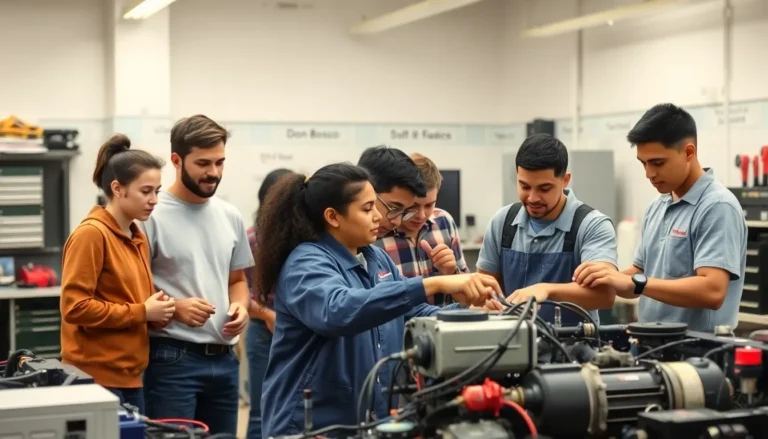In a world where technology often feels like it has a mind of its own, rational tech support emerges as the superhero we didn’t know we needed. Forget the days of long hold times and scripted responses that make you question your sanity. Instead, imagine a tech support experience that combines wit with wisdom, tackling your tech woes while keeping a smile on your face.
Table of Contents
ToggleUnderstanding Rational Tech Support
Rational tech support represents an innovative approach in the realm of technology assistance. This method emphasizes a balance of empathy, expertise, and efficient problem-solving.
Definition of Rational Tech Support
Rational tech support refers to a strategic assistance model designed to eliminate frustration in tech-related issues. This model combines human interaction with technical knowledge, focusing on user experience. Technicians engage actively with customers, encouraging dialogue and understanding needs. By fostering an environment of transparency and flexibility, rational tech support breaks free from traditional scripted responses.
Importance in Today’s Technology Landscape
Understanding the importance of rational tech support reveals its impact on user satisfaction. In an era marked by rapid technological advancements, effective support becomes crucial. Customers expect immediate and competent solutions, making traditional models less viable. Rational tech support addresses these expectations through personalized service and responsiveness. This approach enhances loyalty, improves retention rates, and fosters a positive reputation in an increasingly competitive market.
Key Features of Rational Tech Support

Rational tech support incorporates several essential features that elevate the user experience. These features focus on delivering tailored solutions to meet customers’ needs effectively.
Proactive Problem Solving
Proactive problem solving defines rational tech support. Technicians identify potential issues before they escalate through continuous monitoring and analysis. This anticipatory approach minimizes downtime and reduces frustration for users. It prioritizes solutions that prevent common problems, allowing customers to focus on their tasks without interruption. For instance, software updates can often address vulnerabilities before they affect user operations. Staying ahead of issues fosters trust and demonstrates commitment to user satisfaction.
Effective Communication Strategies
Effective communication strategies enhance the rational tech support experience. Technicians engage with customers in a clear and relatable manner, avoiding technical jargon. They listen actively, ensuring they fully understand the user’s problems and concerns. This dialogue creates a collaborative atmosphere where customers feel valued. Providing tailored explanations empowers users and builds their confidence in handling tech issues. Regular updates throughout the support process also maintain transparency, reassuring customers about the status of their concerns.
Benefits of Rational Tech Support
Rational tech support offers numerous advantages that enhance the overall experience for users and companies alike.
Enhanced User Satisfaction
User satisfaction significantly improves with rational tech support. Technicians engage actively, addressing concerns in a relatable and clear manner. Personalized interactions foster a sense of understanding, making users feel valued. Responses come quickly, which minimizes frustration and builds confidence in handling tech issues. Regular updates keep users informed during the support process, enhancing their experience further. Such an approach creates strong customer loyalty, as satisfied users are likely to return in the future. Satisfaction rates soar when customers experience immediate and competent solutions.
Increased Efficiency in Problem Resolution
Efficiency in problem resolution sees a marked increase with rational tech support. Technicians employ proactive problem-solving techniques, identifying potential issues before they arise. This leads to minimized downtime and less frustration for users. Swift resolution allows technicians to tackle multiple inquiries effectively. Clear communication also plays a vital role, as it enables technicians to understand user needs quickly. Efficient strategies lead to a streamlined support experience, contributing to enhanced performance metrics for organizations. Time savings in addressing problems translate directly into increased productivity for users and companies alike.
Challenges in Implementing Rational Tech Support
Implementing rational tech support presents several challenges that organizations must address. Identifying and overcoming these obstacles is crucial for success.
Resistance to Change
Resistance to change often hinders the adoption of rational tech support. Employees accustomed to traditional methods may hesitate to adjust their practices. Unfamiliarity with new approaches can lead to reluctance or pushback. Organizations must communicate the benefits of rational tech support clearly to ease transition fears. Cultivating an open environment encourages employees to embrace innovative practices. Addressing concerns proactively enhances staff willingness to learn and adapt.
Training and Resources Required
Training and resources play a significant role in the implementation process. Organizations must invest in comprehensive training programs to equip technicians with necessary skills. Proper resources ensure that teams can provide effective support and maintain high standards. Technology must be integrated seamlessly into existing systems for optimal performance. A lack of adequate resources may result in inefficiencies and frustration among staff. Continuous training updates are essential to keep pace with evolving technology trends, fostering a culture of growth and competency.
Future Trends in Rational Tech Support
Emerging trends are shaping the future of rational tech support, focusing on efficiency and user engagement.
Integration of AI and Automation
Artificial intelligence enhances rational tech support by automating routine tasks. Chatbots provide immediate responses to common queries, allowing technicians to focus on complex issues. Effective machine learning algorithms analyze previous interactions, predicting user needs and tailoring future responses. Organizations can expect improved efficiency as AI streamlines processes in handling requests. Service desks experience reduced operational costs, enabling better allocation of resources. Implementing automation leads to quicker resolution times and heightened user satisfaction.
Focus on Customer Experience
Customer experience stands at the forefront of rational tech support. Personalized interactions forge meaningful connections between technicians and users. Listening actively to concerns fosters trust, enhancing customer relationships. As organizations prioritize empathy and understanding, they position themselves to meet diverse user needs. Regular updates and clear communication keep users informed throughout the support journey. Building confidence among users empowers them to address tech issues independently. Enhanced customer experiences directly contribute to increased loyalty and positive brand reputation in a competitive market.
Rational tech support is reshaping the way organizations approach customer service in a technology-driven world. By prioritizing empathy and effective communication, it not only resolves issues but also builds trust and loyalty among users.
As companies adapt to this innovative model, they’ll discover that a proactive and engaging approach leads to enhanced user satisfaction and improved operational efficiency. Embracing rational tech support isn’t just a trend; it’s a strategic move towards a more responsive and user-centered service experience.
The future holds exciting possibilities as AI and automation become integral to support strategies. By focusing on personalized interactions and continuous improvement, organizations can foster lasting relationships with their customers and stand out in a competitive landscape.




